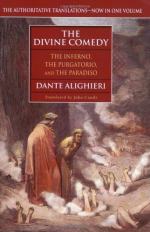|
This section contains 912 words (approx. 3 pages at 400 words per page) |

|
Not all epics conform to one definition; however, they share enough of the same poetic characteristics so that we can group them under the genre label of epic. Traditionally epics deal with grandly important themes, often begin "in the middle of things," in medias res, take place over an extended period of time and a large area, have a large cast and involve heroic, often legendary, characters. In keeping with their serious subject matter, epics often involve the gods or God in some way. They are narrative in form; in other words, they tell a story. Epics are written in verse of a high register; that is, then-authors use formal language and poetic devices like symbolism, metaphor and simile, which is a kind of metaphor or figurative language. Dante's Divine Comedy utilizes all of these characteristics.
Dante's epic tells the story of the Pilgrim's journey from sin to...
|
This section contains 912 words (approx. 3 pages at 400 words per page) |

|




